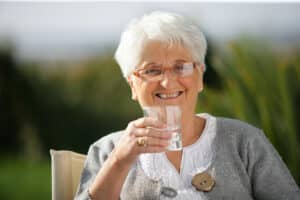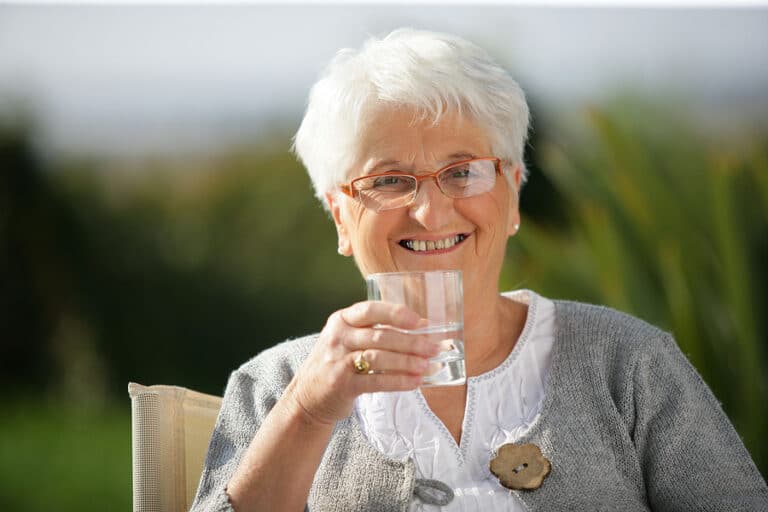
Dehydration is quite common in seniors and it can lead to several health issues and further complicate existing problems. Because the total body water decreases as people age, seniors can get dehydrated more quickly than younger adults do. Dehydration can cause a lot of problems with seniors, from constipation and urinary tract infections to kidney stones, respiratory conditions, slower wound healing and dizziness which lead to falls. Family caregivers need to take steps to ensure that their senior loved one is properly hydrated, especially in warm summer weather.
Common Risk Factors for Dehydration in the Elderly
Age isn’t the only thing that boosts the risk factors for seniors becoming dehydrated. Several different conditions and problems may put elderly loved ones at a higher chance of becoming dehydrated and family caregivers and elder care assistants must become familiar with them to watch for any warning signs. Chronic diseases, neurologic conditions and some prescription medications, to name a few, all can exacerbate dehydration quickly.
Other risk factors for dehydration in seniors can stem from eating and swallowing problems such as from a stroke or a neuromuscular condition. Extra hot weather that causes sweating can also deplete the body quickly. Don’t forget about bouts of diarrhea or vomiting as the gateway to dehydration in the elderly. Still other factors include obesity, being bedridden, and resisting drinks to control incontinence. Knowing the risk factors that may lead to dehydration in aging loved ones will give family caregivers a clue in what to look for.
Symptoms of Dehydration in Seniors
It can be a bit tricky to figure out whether they symptoms that an elderly loved one is showing are really dehydration. The clearest symptom of dehydration—thirst—may not even be noticed in seniors as they are often slow to detect thirst as they age. Other early symptoms of dehydration include headaches, general weakness, sleepiness, irritability, slight muscle cramps and darker yellow urine. When dehydration gets more serious, symptoms can include rapid pulse and breathing, serious muscle cramps, low blood pressure, sunken eyes, and even convulsions. Family caregivers should do their best to make sure elderly loved ones don’t get to a state of serious dehydration.
Preventing Dehydration in Aging Loved Ones
Keeping an aging loved one well hydrated isn’t easy but there are several great tips that can help. Family caregivers should notify other family members, elder care assistants and any others about their efforts to avoid dehydration in their loved one. At every opportunity, seniors should be encouraged to drink small amounts of fluid, not just at meals. Seniors often do better with small amounts that are spread out instead of large amounts just a few times. Also, elderly loved ones should avoid liquids that actually contribute to dehydration such as alcohol, caffeinated sodas and coffee in large quantities. Fruits such as watermelon, oranges and apples also help hydrate the body. Other ways to boost liquid intake includes milk, smoothies and fruit juices.
It’s never a bad idea to boost water intake for seniors because it’s so easy for them to become dehydrated. When their body is hydrated, it lowers their risk of health complications and illnesses.
If you or an aging loved one are considering elderly care in Arlington, VA, contact the caring staff at Access Home Care Inc. Proudly Serving Northern Virginia and Surroundings for over 12 years. Call Us: (703) 765-9350
Source:
http://www.h4hinitiative.com/everyday-hydration/how-your-needs-change-over-time/hydration-and-elderly
“My desire to enter into nursing started when one of my older sisters died of kidney disease due to lack of care. At age 15, I decided to enter into nursing so that I could provide quality care to patients.Upon arrival in United States at 21 years of age, I enrolled in T.C Willliams School of Practical Nursing while working as a nursing assistant at a nursing home. I also worked as a part-time home health aide to take of the elderly. After completion of my practical nurse education, I worked in geriatric psychiatry unit at Dominion Hospital and Arlington Correctional facility mental health unit.
I completed Marymount University in 2001 and entered into Home Care as a field case manager.
I held that position for 2 years and as an Administrator, and for another 2 years until Access Home Care was found in 2004."
Today, Access Home Care has over 300 employees and 286 clients.
- Five Tips for Living with Chronic Lower Back Pain - April 3, 2025
- How 24-Hour Home Care Is Different From Other Types Of Care - March 19, 2025
- Four Symptoms of Advanced Multiple Sclerosis - March 5, 2025



